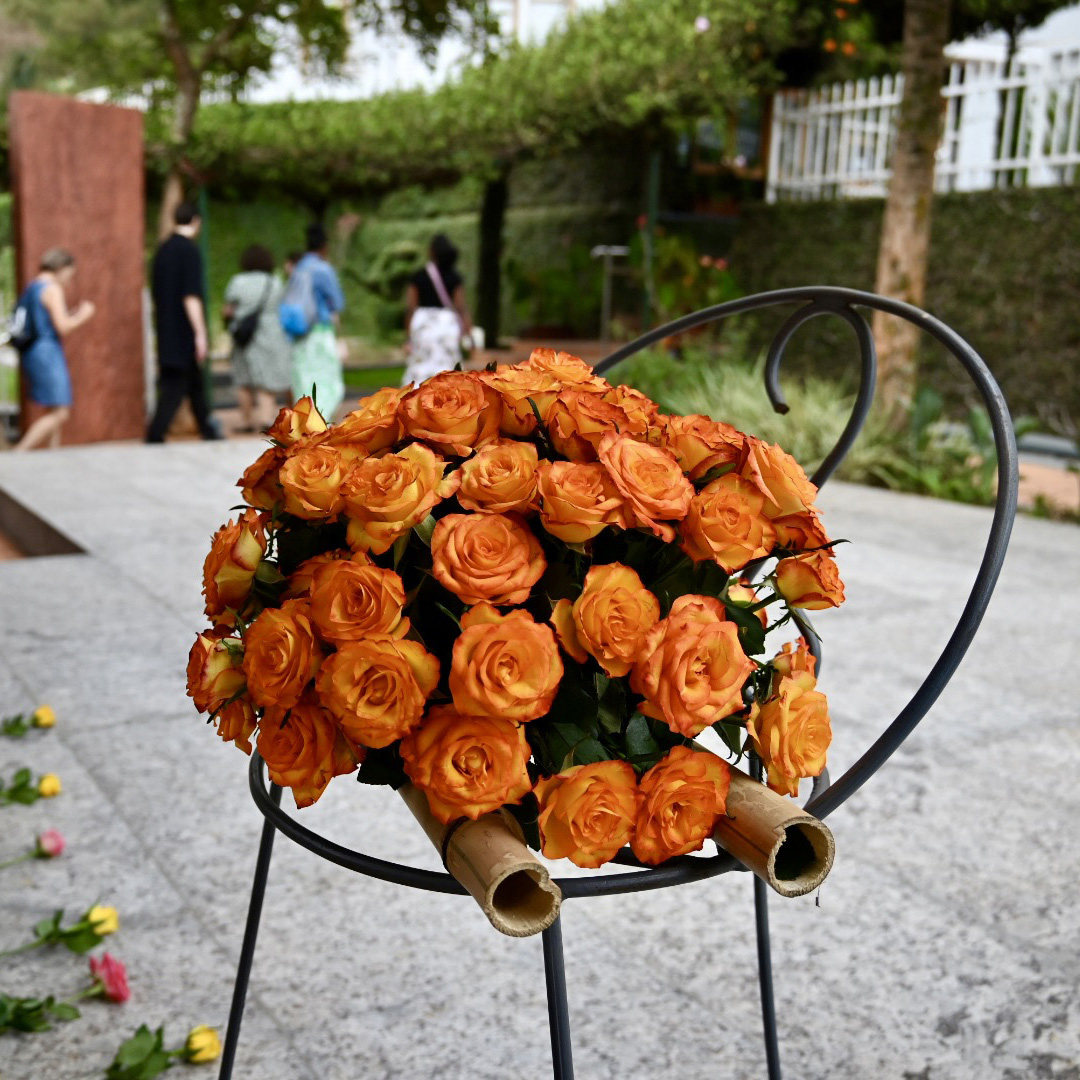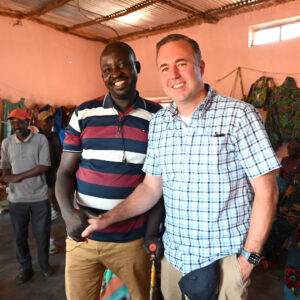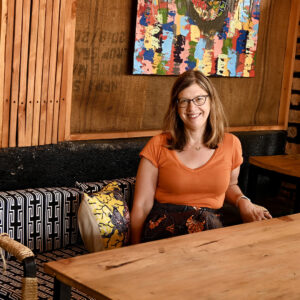Seeing Rwanda anew
TCNJ global learners take on fresh perspectives from the land of a thousand hills.

Students laid a wreath of roses on the site of a mass grave at Kigali Genocide Memorial.
This past summer, 17 members of the TCNJ community traveled to Rwanda for a unique study abroad trip that included faculty, students, and alumni. It was a trip several semesters in the making, with faculty leads Matthew Bender and Cynthia Paces (both history professors) seeing this as an important time to visit Rwanda because 2024 marks 30 years since genocide occurred there.
In 1994, close to one million Rwandans were killed in just 100 days. Most were part of a group known as the Tutsi. The genocide, planned by members of the Hutu political elite but largely perpetrated by everyday Hutus, has had devastating and long-term impacts in the country and the region as a whole. This faculty-led tour examined the origins and implications of Rwanda’s genocide, as well as studied how the country has approached the processes of healing, rebuilding, and remembering.
“Rwanda is an example not only of the factors that lead to genocide and other atrocities, but also of the challenges and debates that come with rebuilding and healing from them,” says Bender. “The 30-year mark of the Rwandan genocide provided a great moment for a delegation from TCNJ to visit the country and learn from its people.”
Our TCNJ travelers visited the capital city of Kigali, memorial centers, a reconciliation village, governmental organizations, small markets, and Akagera National Park (where they took a safari). All along the way, they were witnesses to the collective resilience of Rwandans.
“We were able to interact with scholars, survivors, and perpetrators in a way that would not have been possible through any other learning medium,” says alumna Brittany Hamilton ’15, who teaches social studies at Hillsborough Middle School. “I was able to see the emotions in their faces, and feel it in their handshakes. You just can’t get that from books.”
Bender, Hamilton, Paces, and some of the other travelers shared their observations in their photos and journal entries.
Matthew Bender, history professor

genocide survivor at a reconciliation village
Rwanda is a beautiful and complicated place. The process of rebuilding has been inspirational, at times controversial, and by no means easy. One thing that is clear is that people have a genuine sense of pride in what they have done to rebuild, and a sense of optimism about the future.
I developed the idea for this travel course nearly three years ago. From the start, I envisioned the course not only for faculty and undergraduates, but also for graduate students, alumni, and friends of the college, so that we’d have a diverse group of participants who could learn together, and from one another.
Much of our trip involved meeting with everyday Rwandans. We met with genocide survivors and perpetrators. We met with older people and children. We met with community organizers and people working for government and civil society organizations. These experiences were tremendously powerful, and were by far the moments where we learned the most.
Cynthia Paces, history professor

Experiencing the memorial sites in person allowed us to think about the long-term effects of trauma, the decisions societies make about how to remember traumatic events, and our personal perspectives on how best to commemorate violence and genocide. I believe strongly in bearing witness to trauma, comparing societies that have experienced genocide, and assessing the dangers of prejudice and hate speech in our own culture.
I loved visiting the grassroots organizations that often grew from the ideas and passions of individuals and small groups. A highlight was the Women’s Bakery, which provides nutritious bread for elementary schools and employs women who can bring their babies to work in a setting with an on-site day care. We also visited a former orphanage that is now a community center and preschool, and we learned the powerful history of how its staff rescued hundreds of Tutsi during the genocide. Interacting with children at these places was a highlight and reminded us of humanity’s resilience.
Louis DiGirolamo ’22, high school history teacher
In class today, we discussed how the categories of Hutus and Tutsis came to be. Originally, they were simply social classes that defined a line of work. The Rwandan people were easily able to change their class through marriage or taking on another line of work. Being Hutu or Tutsi was not about anything related to race or ethnicity. The Rwandans all had the same skin tone and lived in the same country. The entire meaning of what it meant to be Hutu or Tutsi changed when the Belgians colonized Rwanda. The Belgians implemented this ideology that the Hutus and Tutsi differed, that the Tutsi had physical features that made them more European. Therefore, the Belgians started treating the Tutsi more favorably than the Hutu, which built animosity among the Hutu against the Tutsi that ultimately led to the genocide many years later.
At the Kigali Genocide Museum, one particularly powerful exhibit displayed photographs of the victims — at their wedding, eating lunch together, playing sports, and smiling. It was moving because it provided a glimpse into the stories of the victims and underscores that they were once living human beings who enjoyed life and the same niceties of living that we often take for granted. Many of the photos I have taken on my own phone, of events in my own life, are similar to the photos depicted in the exhibit.
Madison Trost ’22, graduate student at University of Edinburgh
One of the locations we went to was Prison Fellowship Rwanda, where they examine how female perpetrators are treated in society. Women who committed genocidal acts were treated very differently from men when it came to being accepted back into society. Women in Rwandan culture are part of two families: their own parents’ and their husband’s family. However, after the genocide, both families tended to shun and refuse to claim women who had participated. I felt as though these women were being hidden in the narrative of reconciliation, and forgotten.
My takeaway from this experience was not only how massively impactful the genocide was on everyone in Rwanda, but also how important my interest in women perpetrators is to understanding how genocides happen, and how important it is to accurately represent the actions of women in genocides.
Brianna Pollock ’26, history major
What stood out to me the most about how Rwandans have rebuilt is the three core philosophies that have emerged in their efforts: unity, accountability, and a determination to think big. First, nearly all sectors of Rwandan life, from basic necessities to reconstruction to mental health, are now connected in some form (mostly through the government), with the goal of becoming as singular as possible to prevent any future divisions. Next, accountability emerges through understanding just how many average civilians took part in the genocide. As the country rehabilitates those citizens, it also works to prevent any further egregious acts through systems designed to keep people in check (for example, the phone numbers of services and supervisors are publicly available for anyone to call in case of violations). Finally, thinking big is the most abstract of the governing core philosophies, but shows itself through the levels of unity and accountability the country has reached that go beyond what anyone could have expected.
Brittany Hamilton ’15, middle school history teacher
I found myself continuously impressed with the kindness and openness of the people. There was no question we asked that they found too rude to answer.
Visiting the sites of the massacres was heavy. There were two former Catholic churches that held the clothing and remains of hundreds of victims each. Just walking inside, you could feel the pain and memory in the place. It hurt.
Every person and place in the world will define forgiveness differently. In Rwanda, it is such a tangible element of their culture. Survivors of the genocide are living next door to perpetrators of the genocide, and their children are marrying one another. It’s a beautiful testament to the power of forgiveness.
Anjanae Haqq ’03, and her daughter, Naabiah
After spending two weeks in Rwanda with my youngest daughter of four children, I’m optimistic she will recognize she sits in a place of privilege and will use her talents and resources to do good in the world. I’m undoubtedly believing she was inspired by the young adults in Rwanda to become a positive proof of change.
Rwanda is a place where people live with a purpose; a place of unity, cooperative economics, creativity, collective work and accountability; a place that values the environment (with streets cleaner than most suburban streets I’ve traveled on in America); a place where people are proud to be who they are; a real-life Wakanda in action; and a place that will remain forever in my heart.
Posted on September 14, 2024

